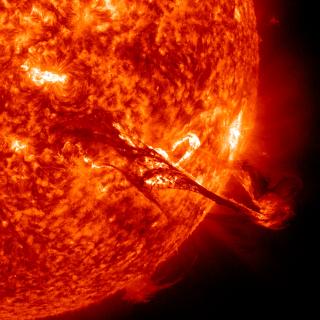Bibcode
Collados, Manuel; Schaffer, Carl; Hederer, Thomas; Franz, Morten; Yakobchuk, Taras; Vigeesh, Gangadharan; Patel, Sani; Schmassmann, Markus; Kehusmaa, Petri; Knobloch, Markus; Hohl, Lea; Hochmuth, Alexander; Hamdan, Kamal; Günter, Marco; Gorobets, Andrei Y.; Diercke, Andrea; Gorbachev, Iaroslav; Bührer, Andreas; Berdyugina, Svetlana; Bello González, Nazaret; Beck, Janek; Caligari, Peter; Aghaei, Faezeh
Bibliographical reference
Solar Physics
Advertised on:
10
2024
Journal
Citations
0
Refereed citations
0
Description
With the steady improvement of the observing capabilities and numerical simulations, an efficient data management of large data volumes has become mandatory. The Institute for Solar Physics (KIS) has developed the Science Data Centre (SDC), a data infrastructure to store, curate, and disseminate science-ready data from the German solar-observing facilities and other partner institutions. The SDC was also conceived to create and disseminate higher-level data products of added value like inversions from spectropolarimetric data. The SDC archive infrastructure consists of a back-end based on the Rucio science data-management and MongoDB systems and a front-end web interface that allows the user to search and discover data based on search parameters like instrument, date, wavelength range, and target. The SDC archive also provides data access via API and TAP services. The SDC currently offers access to 1299 science-ready datasets from the GRIS instrument at the GREGOR telescope (Tenerife) since 2014, a set of 610 spectra from the LARS at the Vacuum Solar Telescope (VTT, Tenerife) and 202 404 full-disc solar images from the Chromospheric Telescope (ChroTel). The SDC also offers to the community Milne–Eddington inversions of the GRIS spectropolarimetric archived data that can be downloaded as well as tools for data visualization and advanced analysis (e.g., GRISView tool). Many SDC activities have been carried out within the framework of large international data projects like the Horizon 2020 ASTERICS and ESCAPE EU-funded projects under the FAIR (Findable, Accessible, Interoperable, Reusable) principles. New and planned SDC activities include the ingestion of solar data from GREGOR context imaging instruments, flare observations from Ondřejov Observatory (Czech Republic), archiving and dissemination of in-house magnetohydrodynamic simulations, and creation of high-level data products using machine learning. The KIS Science Data Centre is a state-of-the-art data-management infrastructure that curates, archives, and provides access to ground-based science-ready spectropolarimetric and imaging solar data. SDC also provides advanced data visualization and analysis tools and invites data providers to publish their data to the solar and broader (astro)physics community via the SDC data archive.
Related projects

Solar and Stellar Magnetism
Magnetic fields are at the base of star formation and stellar structure and evolution. When stars are born, magnetic fields brake the rotation during the collapse of the mollecular cloud. In the end of the life of a star, magnetic fields can play a key role in the form of the strong winds that lead to the last stages of stellar evolution. During
Tobías
Felipe García